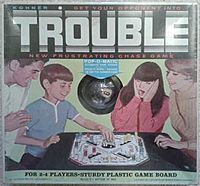Trouble (board game) facts for kids
 |
|
| Designer(s) | Frank Kohner, Paul Kohner, Fred Kroll |
|---|---|
| Publisher(s) | Hasbro, Winning Moves Games USA |
| Publication date | 1965 |
| Players | 2–4 |
| Setup time | 1 minute |
| Playing time | 30 minutes |
| Random chance | High (dice) |
Trouble (known as Frustration in the UK and Kimble in Finland) is a board game in which players compete to be the first to send four pieces all the way around a board. Pieces are moved according to the roll of a die. Trouble was developed by the Kohner Brothers and initially manufactured by Irwin Toy Ltd., later by Milton Bradley (now part of Hasbro). The game was launched in America in 1965. The classic version is now marketed by Winning Moves Games USA.
The gameplay, board, and concept is derivative of the Indian board game, Ludo.
A similar game called Headache was also produced by the Milton Bradley Company; besides a different track layout, its pawns are conical, compared to the cylindrical pieces used in Trouble.
Gameplay
Players can send opponents' pieces back to the start by landing on them. Players may not touch the other player's piece, otherwise the piece's owner must redo the pop/roll. Teaming is not allowed in the game. Pieces are protected from capture after arriving in the final four slots. Unlike more complex race games, however, counters cannot be maneuvered to block opponents' moves.
The most notable feature of Trouble is the "Pop-O-Matic" die container. This device is a clear plastic hemisphere containing the die, placed over a flexible sheet. Players roll the die by pressing down quickly on the bubble, which flexes the sheet and causes the die to tumble upon its rebound. The Pop-O-Matic container produces a popping sound when it is used, and prevents the die from being lost (and players from cheating by improper rolling). It allows for quick die rolls, and players' turns can be performed in rapid succession. The die is imprinted with Arabic numerals rather than the traditional circular pips (though the circular pips are used in the Travel version, which contains a cover to keep the pegs from being lost).
Players may move pieces out of their start only when the die lands on 6. Getting a 6 at any point in the game also allows the player to take another turn, even if the player cannot move any of their pieces (as they cannot land on any of their own pieces). They can also move a new piece out even if they have another piece currently in play, and can also do the same if another player's piece is occupying their "start" space, but cannot do so when one of their own pieces is occupying their "start" space.
If the die in the "Pop-O-Matic" container has not clearly landed on a number, then the player who popped it can tap the "Pop-O-Matic", but may not re-pop while the die is in limbo.
Editions
- Double Trouble (1987) - was originally published by Milton Bradley. It is currently being produced in the USA by Winning Moves Games USA. In this Variation of Trouble players move both arrow playing pieces along the path through detour wheels and to the finish spaces. Each player tries to remove their two pieces from the board. Each piece that lands on one of the Finish spaces is removed. There are four wheels built into the board. When a players lands on a Star space, they must turn a wheel. If pieces are on the chosen wheel then they will stay there but may have to exit on to a different route than they intended. Thus players can help themselves or hinder their opponents.
See also
 In Spanish: Trouble (juego de mesa) para niños
In Spanish: Trouble (juego de mesa) para niños

